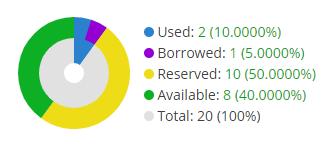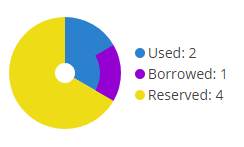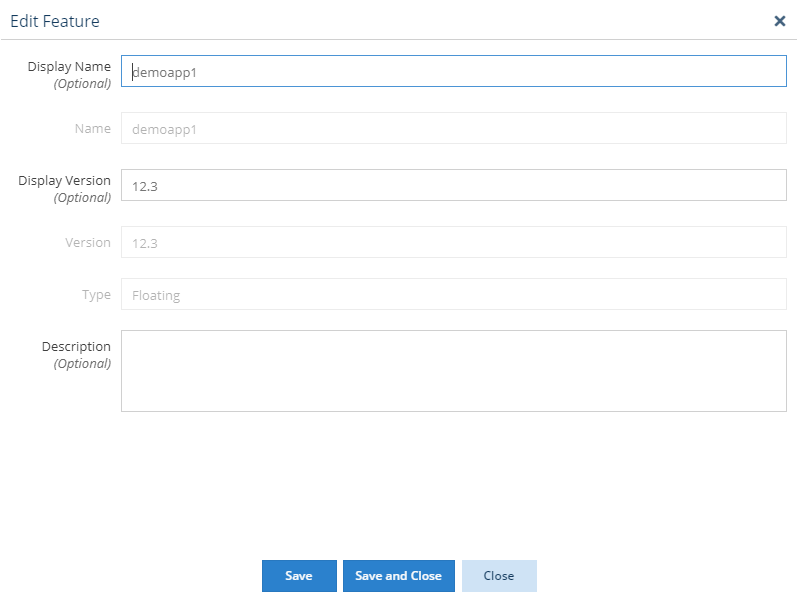The information on this page refers to License Statistics v6.15 and newer, which added "Available" license count and percentage to the General Information area. If you are using a version previous to v6.15, see documentation for previous versions. |
This page gives details about general usage of feature reports, including how to use the General Information area at the top of reports; identify feature version/type; control feature visibility, and edit features.
All feature usage pages include a General Information area at the top of the page.
To choose the feature for which to view statistics, use the License Server and Feature pick lists in the General Information area at the top of the page. You can select either an individual license server or a license server group from the License Servers pick list. Some pages also let you select "All" license servers/features for viewing. After selecting the license server/license server group, the Feature pick list will then contain all features within that license server/license server group for you to choose from.
The General Information area shows identifying information for the selected feature (which can be edited), including:

Notes:
The color-coding of the text used for "Last Update Time" indicates the minutes elapsed since the last update time:
| Minutes elapsed since last update time | Color indicator |
|---|---|
| 0 - 10 | Green |
| 10 - 20 | Orange |
| 20 or more | Red |


A warning icon ![]() next to the count of Used, Borrowed, and Reserved licenses in the General Information area of the Features pages indicates that you are using old licenses that have expired. This happens in cases where:
next to the count of Used, Borrowed, and Reserved licenses in the General Information area of the Features pages indicates that you are using old licenses that have expired. This happens in cases where:

A warning icon ![]() for expired features with active licenses is also visible in the Used column of the Feature Usage grid.
for expired features with active licenses is also visible in the Used column of the Feature Usage grid.

Throughout License Statistics, features shown in lists include a separate entry for each version of that feature, and are named feature_version. Versioning provides a finer granularity to report results, which is useful when you have multiple versions of particular features that you want to track individually. For example, under IBM LUM, the Catia MD2 application cost varies depending on version, so Feature Versioning can help when considering budget for one version versus another version.
Feature names in lists also include the feature type, which can be Floating, Nodelocked, or Token. Note that if a given feature has more than one type, it will be listed once for each type.
For example, say you have a feature called F1, for which you have a floating installation of version 1.0 and both a node-locked and floating installation of version 2.0. This would appear in Feature lists as follows:
F1 (v1.0, Floating)
F1 (v2.0, Floating)
F1 (v2.0, Nodelocked)
In grids such as License Server Current Usage, feature identifiers are displayed in three separate columns: Name, Version, and Type. If a given feature has more than one type, it will be listed in usage grids once for each type.
You can hide the currently selected feature by clicking the Hide icon ![]() in the upper right of the General Information title bar.
in the upper right of the General Information title bar.
You can edit the currently selected feature's information that displays in the Features pages by clicking the Edit icon in the upper right of the General Information title bar.

The Edit Feature dialog opens.

Using the Edit Feature dialog, you can enter/edit the following optional information for the feature:
| Field | Description |
|---|---|
| Display Name | A name for the feature that will be shown in reports. The actual feature name (reported by the license server, and shown in the Name field in this dialog) will be shown in reports if the Display Name is unspecified. |
| Display Version | A version for the feature that will be shown in reports. The actual feature version (reported by the license server, and shown in the Version field in this dialog) will be shown in reports if the Display Version is unspecified. |
| Description | A description for the feature that will be shown in reports. |